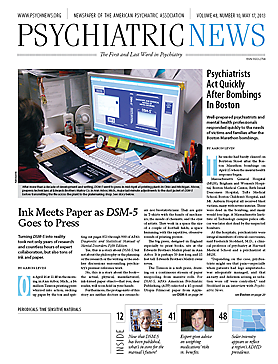Overexercise to control one’s weight or shape appears to be a suicide risk factor for young people, four studies reported in the April 30 Psychiatry Research suggest.
The studies were headed by April Smith, Ph.D., an assistant professor of psychology at Miami University in Ohio.
And they are “persuasive in supporting the idea that overexercise is not only physically, but also psychologically, deleterious,” Michael Devlin, M.D., told Psychiatric News. Devlin is clinical coordinator of eating disorders research at the New York State Psychiatric Institute. He was not involved in the study.
The first study included 204 young women who met full or partial criteria for a DSM-IV diagnosis of bulimia nervosa. The researchers evaluated the subjects not just for bulimic behaviors such as vomiting, purging, and fasting, but for overexercise, defined as “hard exercise as a means of controlling weight or shape.”
Most of the subjects (60 percent) reported engaging in hard exercise over the previous 28 days, with a range from one episode to 84 episodes. The subjects were also evaluated for suicidal gestures and attempts. Finally the researchers looked to see whether overexercise in the cohort significantly predicted suicidal gestures and suicide attempts, even when other bulimic behaviors such as vomiting, purging, and fasting were considered. They found that it did.
The second study included a nonclinical sample—171 college students (80 percent of whom were female). The subjects were evaluated for bulimia nervosa behaviors, including overexercise, as well as for acquired capability for suicide—defined as fearlessness about lethal self-injury and ability to tolerate pain. The researchers found that overexercise predicted acquired capability for suicide even when other bulimia nervosa behaviors were considered.
Thus it looked as if overexercise might be able to contribute to suicidal behavior in young people bent on controlling their weight or shape through such intense exercising. But if this were the case, how might overexercise have such an impact? Smith and her colleagues conducted a third study to find out.
In this study, with a new sample of 467 college students (57 percent female), Smith and her colleagues found that overexercise significantly predicted pain insensitivity over and above other bulimic behaviors and that pain insensitivity in turn significantly predicted an acquired capability for suicide.
Finally, in a fourth study using a new sample of 512 college students (80 percent female), Smith and her team wanted to find out whether acquired capability for suicide accounted for the relationship between overexercise and suicidal behavior. They found that such an association did exist.
“Overall, the results of the four studies converge to suggest that overexercise is related to suicide attempts through its association with pain insensitivity and the acquired capability for suicide,” the researchers concluded.
“This is a thoughtfully designed series of studies that is centered on the concept of acquired capability for suicide, essentially a lowering of barriers to suicide that are related to the anticipation of pain,” Devlin commented. “Although only one in four studies was conducted in a sample of women with bulimia nervosa, the findings suggest a link between overexercise and suicidal behavior that is in part related to the degree to which overexercise leads to pain insensitivity and to an increase in acquired capacity for suicide. As the authors acknowledge, the studies are cross-sectional, limiting the degree to which causal inferences can be made and the confidence with which we would use the findings to support treatment recommendations.” But nonetheless, the results do suggest that overexercise is psychologically deleterious, and “while therapists have always recommended against overexercise, they now have an additional reason to do so,” he said.
The study was funded by a National Research Service Award from the National Institute of Mental Health. ■

